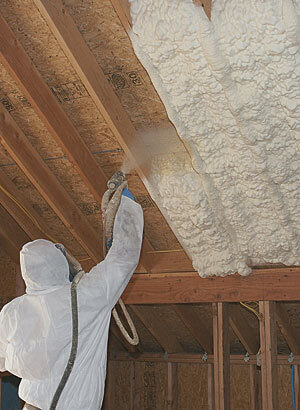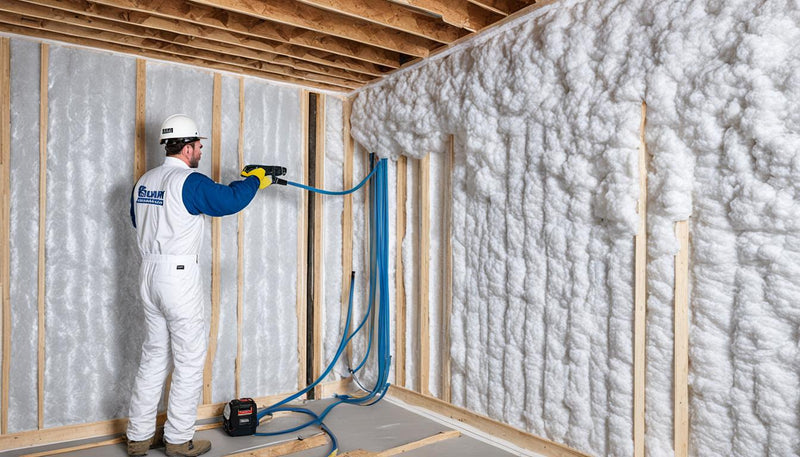Contrasting Spray Foam to Standard Insulation: Which Is Better?
Contrasting Spray Foam to Standard Insulation: Which Is Better?
Blog Article
Spray Foam: The Ultimate Remedy for Air Sealing and Insulation
Spray foam insulation has arised as a leading remedy for effective air sealing and thermal insulation, using an one-of-a-kind combination of residential properties that establish it apart from standard approaches. Its capacity to expand and fill spaces makes it especially efficient in protecting against air leak, which can significantly affect energy effectiveness. Nevertheless, recognizing the complete extent of its advantages, installment procedures, and contrasts with various other insulation types is vital for making educated choices. As we check out these elements, the ramifications for both new constructions and retrofits become increasingly significant. What factors should affect your selection?
What Is Spray Foam?
Spray foam is a flexible insulation material that combines the concepts of air sealing and thermal resistance to enhance power effectiveness in buildings. Made up mainly of polyurethane or other comparable compounds, spray foam is used as a liquid that expands upon call with surfaces, developing a solid, continuous layer of insulation. This one-of-a-kind building enables it to fill spaces, cracks, and gaps that conventional insulation products may overlook, supplying an exceptional air seal.
There are 2 main kinds of spray foam: open-cell and closed-cell. Open-cell spray foam is lighter and much more adaptable, using excellent noise absorption and a reduced R-value per inch - Spray Foam. On the other hand, closed-cell spray foam is denser, giving a higher R-value, dampness resistance, and added architectural integrity to developing parts
The application process commonly involves customized equipment, making sure a smooth application that abides by different substratums, including wood, concrete, and metal. This versatility makes spray foam ideal for both new buildings and retrofitting existing frameworks. Its ability to create a closed obstacle significantly contributes to minimizing power consumption and enhancing interior air top quality, therefore making it a preferred option among building contractors and homeowners alike.
Advantages of Spray Foam Insulation
Among one of the most significant advantages of spray foam insulation is its extraordinary capability to produce a constant air obstacle, which successfully decreases power loss. Unlike typical insulation products, spray foam increases to load voids and splits, making certain that air leak is drastically reduced. This characteristic not just boosts power performance however likewise results in reduce utility bills with time.
Additionally, spray foam insulation provides premium thermal resistance, adding to a much more secure indoor setting. Its high R-value per inch permits for efficient insulation in restricted spaces, making it ideal for attic rooms, wall surfaces, and crawl areas. Additionally, the moisture-resistant homes of spray foam help prevent mold and mildew and mildew growth, advertising healthier living conditions.
One more crucial advantage of spray foam insulation is its sound-dampening high qualities (Spray Foam). It efficiently lowers noise transmission in between spaces, creating a quieter and a lot more comfortable home atmosphere. The resilience of spray foam additionally stands apart, as it does not droop or clear up over time, preserving its efficiency throughout its life expectancy
Just How Spray Foam Works
Recognizing how spray foam insulation functions is essential for valuing its performance in air sealing and thermal resistance. Spray foam insulation is composed of two main parts: isocyanate and polyol resin. When these elements are mixed, they undertake a chemical reaction that triggers the product to expand quickly, developing a dense foam that fills up fractures, dental caries, and voids.
As the foam broadens, it sticks to surface areas, forming an airtight seal that substantially lowers air seepage. This characteristic makes spray foam insulation highly effective at stopping drafts and dampness infiltration, which can bring about power loss and damage over time. Additionally, the closed-cell variation of spray foam supplies exceptional thermal resistance because of its stiff framework, properly decreasing warmth transfer.
The distinct residential properties of spray foam permit it to comply with uneven surface areas, making certain thorough insurance coverage and a smooth barrier. As an outcome, spray foam insulation not only improves energy efficiency but additionally adds to boosted interior air high quality by decreasing the build-up of allergens and pollutants. Eventually, comprehending the mechanics behind spray foam underscores its duty as a premium option for insulation more helpful hints and air sealing in both business and property applications.
Setup Process Review

Before installment, the space should be appropriately cleaned and prepped, making sure that surface areas are free from dust, particles, and dampness. Since impurities can endanger attachment and overall performance, this step is essential. When the area is prepared, the application includes blending the 2 parts of the spray foam, which increases upon contact and fills gaps efficiently.
Trained experts ought to carry out the setup, using customized tools to make certain consistent insurance coverage and optimum thickness. Safety and security precautions, consisting of putting on protective equipment and making sure appropriate ventilation, are imperative during this process. After see post application, the foam usually cures quickly, forming a strong obstacle that improves energy performance.
Contrasting Spray Foam to Standard Insulation
When reviewing insulation choices, spray foam pop over here insulation stands out in comparison to standard materials such as fiberglass and cellulose. Unlike fiberglass and cellulose, which can permit air infiltration, spray foam increases upon application, filling holes and spaces to develop a closed seal.
In addition, spray foam supplies a greater R-value per inch than conventional insulation kinds, providing even more effective thermal resistance in a thinner account. This particular is especially beneficial precede with limited tooth cavity deepness. Spray foam is immune to dampness and mold growth, which can be a substantial concern with cellulose and fiberglass, especially in damp settings.
However, spray foam insulation normally lugs a higher in advance expense than its typical counterparts. Property owners have to weigh this initial investment against long-lasting power financial savings and performance benefits. Eventually, while both insulation types offer their objective, spray foam arises as a more sophisticated option for modern-day insulation demands, specifically in regards to air sealing and thermal efficiency.

Conclusion
In summary, spray foam insulation represents a highly effective solution for achieving optimum air securing and thermal resistance. Its one-of-a-kind properties, consisting of dampness resistance and audio dampening, make it appropriate for different applications in both new constructions and retrofitting tasks (Spray Foam). The first costs may be greater compared to traditional insulation products, the long-lasting benefits, such as substantial energy financial savings and enhanced indoor air top quality, validate the investment and highlight its value in modern-day building techniques.
Spray foam insulation has arised as a leading service for effective air securing and thermal insulation, offering an one-of-a-kind combination of residential or commercial properties that establish it apart from conventional approaches.Spray foam is a versatile insulation product that combines the concepts of air sealing and thermal resistance to improve power effectiveness in structures.When assessing insulation alternatives, spray foam insulation stands out in comparison to standard products such as fiberglass and cellulose. Ultimately, while both insulation kinds offer their function, spray foam arises as a more sophisticated remedy for modern insulation requirements, particularly in terms of air sealing and thermal performance.
In summary, spray foam insulation represents an extremely reliable service for accomplishing optimum air sealing and thermal resistance.
Report this page